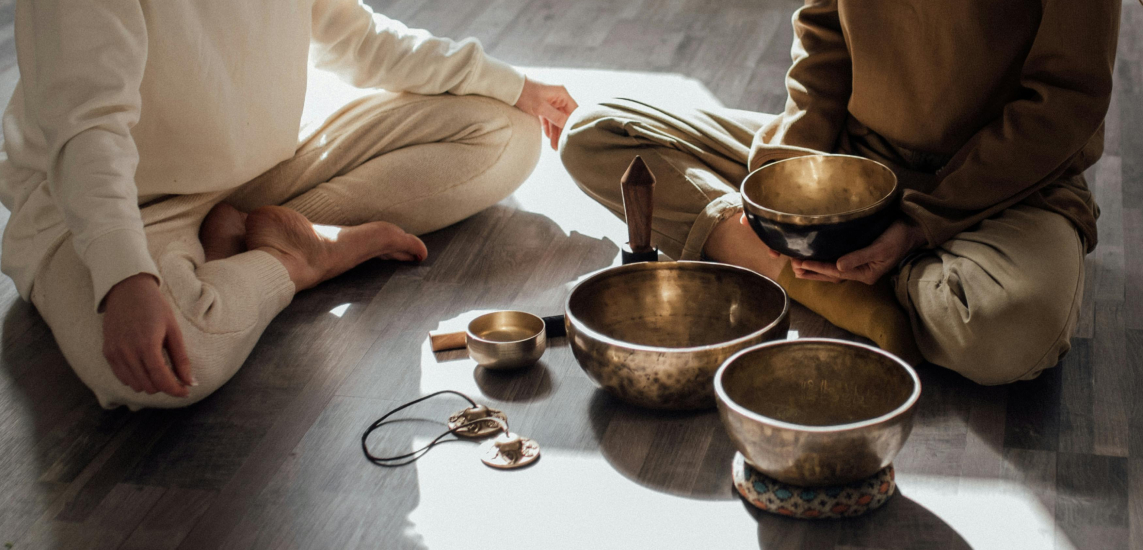When it began dawning on me in early March that we would soon be going into ‘lockdown’, I felt panicked. I’ve never been the most practical person, and trying to ascertain how one might prepare for a ‘worldwide pandemic’ felt a little overwhelming. In hindsight, I just needed some food but at the time my mind was gearing up for Armageddon.
In short, I was in survival mode. As the shock of what was unfolding and the initial anxiety started to wear off, it was replaced with a different kind of anxiety – a kind of fear mixed with emptiness. This feeling was not one I knew well, nor did it make sense. I’ve always enjoyed spending time on my own. However, the idea of spending every day at home, beholden to the innermost workings of my mind while the world around me was spinning, felt a little overwhelming.
I’ve had that feeling once before, just before commencing a 10-day silent meditation retreat; an anticipatory grief for the things I would be made to go without: talking, social contact, books, dinner – my freedom. Only that time, it was a choice.
The Collective Grief Of Things We Have Lost
Psychologists speak of this current moment in time as one of worldwide grieving. Grief and sadness arise in response to something lost, in order to try to help us recover it. Sometimes we can, and our sadness pushes us to pick up the phone, call an old friend and have that difficult conversation to reconnect. Sometimes it cannot be recovered, and that’s the hardest feeling of all – that is grief.
According to pioneering grief expert, Swiss-American psychiatrist Elisabeth Kübler-Ross, grief typically involves five components – denial, anger, bargaining, depression and acceptance. Resilient people are well-practiced in acceptance. They are able to acknowledge, “This is happening. I better figure out how to make it work for me.”
We’ve lost a lot of things recently, including the privilege of leaving our house and connecting with others in real life. Many of us have lost physical touch, space to breathe, and a pervasive loss of safety and security around work, finances, health and loved ones. Not to mention the worst loss of all – the death of friends and family. While our challenges may look quite different – and, admittedly, some are connected to our level of privilege – we are all, at the same time, dealing with significant loss all around the globe.
Read more: There is so much scope for reflection, for creating our vision, for recognising what we want, the values that are precious to us. Explore how psychologically-informed practices help us to create our new normal.
Survival Responses
Fight-Flight-Freeze
So what, if anything, have we gained? When the body is in survival, it tends to display two distinctly different responses. The first is the well-documented ‘fight-flight-freeze’ response, coined by Walter Cannon, an American physiologist and professor back in 1932. We can see examples of this response in the two people fighting over toilet paper in the local supermarket, or the people running to stockpile food. If you’ve had some difficulty getting out of bed of late, then you might be carrying out the ‘freeze’ response. I know I have been.
Tend-And-Befriend
The second is a very different response. The ‘tend-and-befriend’ response was first recognised by Dr Shelley Taylor in 2000, when she began to notice that not everyone moves into fight-or-flight when scared. Typically coined the ‘female’ response to stress, the tend-and-befriend response involves the urge to contact, support and care for family, friends and those who are vulnerable, as well as the desire to connect with and support one’s local community. In order to understand it, we need not look further than the daily actions of New Zealand’s Prime Minister, Jacinda Ardern. Unlike fight-or-flight, the tend-and-befriend response releases oxytocin – the feel-good ‘attachment’ hormone experienced by mothers during childbirth that helps them to bond with their baby. Unlike fight-or-flight, it not only reduces stress, but also strengthens social fabrics. This response is based on the primal premise of cooperation over competition, and the deep knowing that we are stronger when united.
Millions of people all over the world are tending and befriending right now: the teacher that drives past their student’s house to wave from the car and show support; the girl who helps to pay for the groceries of the family in front at the checkout; the nightly applause from windows and balconies as health workers head home from their shifts; reconnecting lapsed relationships with grandparents; and the neighbourhood street that now not only knows each other, but looks out for each other.
What have we gained, then? I think the technical, scientific, psychological term for it is… love. Unsurprising really, given grief is simply the reflection of love.
The 6th Phase Of Grieving: Finding Meaning
David Kessler, recognising something was missing, later added a sixth phase to the Kübler-Ross model of grief – ‘meaning’. The ability to find purpose and meaning in loss is one of the main predictors of whether someone will go on to experience post-traumatic stress following a trauma, or experience post-traumatic growth. Those who can find no meaning in their experience tend to move into depression. So how can we ensure that the world experiences post-traumatic growth post-COVID-19? And no, I’m not referring to gross domestic product or economic growth.
The answer may lie in what kind of meaning we choose to derive from this time of forced stopping. Life is inherently meaningless – but not in a bad way. Just as our eyes are constantly re-creating the image we see in front of us, from brain to retina and not the other way around, we are constantly projecting meaning onto the world around us. This means something powerful – it means we get to choose the story. Often we think we might be choosing, when we’re really just absorbing. The social milieu we exist within influences our narrative greatly. We can get around this by asking ourselves regularly, where has my perspective on this come from? The fear-leaning news? My angry neighbour? A Facebook post? Or a choice within?
Emily Toner has created a 7-day course for Insight Timer to remind you of your immense power, to help you understand the inextricable link between your inner and outer world, and to help us all co-write a better next chapter for humanity. Start listening to lesson 1 of “Creating A Safe World From Within” now.
From Pausing To Changing & Finding Meaning
In researching what leads someone instinctively towards fight-or-flight, or its friendlier tend-befriend counterpart, the one consistent predictive factor that arose was gender. The wisdom of the feminine within all of us, long ignored and dismissed for being less important or less useful. The meaning I choose to create from this time of pausing, is a realisation of the deep wisdom of the feminine within me. A wisdom that, growing up in a male-dominant family and society, I have possibly never fully appreciated or owned – until now.
As Holocaust survivor, neurologist and psychiatrist Viktor Frankl so eloquently said,
“In some ways suffering ceases to be suffering at the moment it finds a meaning.”
So, while sitting in the discomfort and emptiness of grief on a vipassana retreat, I began to know and understand the ways I create suffering for other people, the planet and myself. I also began to understand the immense power I have to change it. I began to realise that the only person who could take action to write this new story was me. So, as we sit around the globe in this time of reflection – a true liminal space – one of the most powerful things we can do is to simply dedicate time to making it all mean something.
After all, we determine the story from here.
Read more: Taking in the good in your daily life is about increasing what’s already positive, maintaining what is positive or creating something new that is positive. Learn how to cultivate positivity bias.
This article first appeared in Peppermint magazine’s Winter Issue 46. Peppermint is an Australian quarterly print lifestyle publication focused on style, sustainability and substance.



-1.jpg)



